Achievements and Announcements
ACHIEVEMENTS
- National accolades for teaching and research dynamos
- Researchers win $1.3m to find better treatments for cancer
- Prostate cancer research will help slash Australia’s $1.3 billion health bill
- Global honour for outstanding nurse researcher
- UniSA economist awarded ARC Fellowship to bolster public trust in water technology
- Liquid crystal nanoparticles supercharge antibiotics for cystic fibrosis
- Business Intelligence Analyst Eric Ho honoured for promoting multiculturalism
- UniSA graduates dominate 2024 Helpmann Academy Awards
- Creative industries student shines with youth-centric TV show
- Other recent award winners
ANNOUNCEMENTS
- Meet UniSA’s 200,000th graduate
- UniSA outperforms SA universities for graduate employment
- Embodied carbon and overconsumption threatens SA’s green future: academic
ACHIEVEMENTS
National accolades for teaching and research dynamos
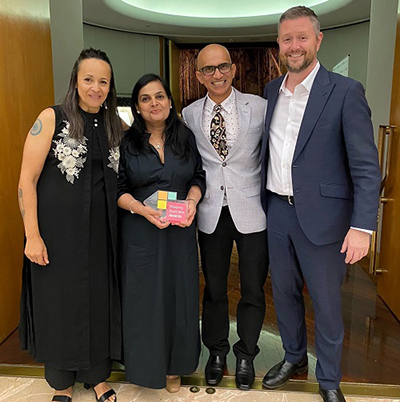 From left: Dr Nicola Massy-Westropp, Dr Harsha Wechalekar, Dr Arjun Burlakoti and Universities Australia Chair UniSA Vice Chancellor David Lloyd at the awards event
From left: Dr Nicola Massy-Westropp, Dr Harsha Wechalekar, Dr Arjun Burlakoti and Universities Australia Chair UniSA Vice Chancellor David Lloyd at the awards eventTwo UniSA teams have taken out wins in the inaugural Shaping Australia Awards, recognising an innovative approach to teaching anatomy, and a celebrated self-help program for farmers.
Presented by Federal Education Minister Jason Clare earlier this year, the awards were launched by Universities Australia to highlight the positive contribution universities make to the community.
UniSA’s Associate Professor Kate Gunn and community collaborator John Gladigau were co-winners of the Community Champion Award for their ifarmwell initiative, which equips farmers to manage stressful situations and help them cope with the challenges of life on the land.
Led by Assoc Prof Gunn, the free online resource was established in 2018 with substantial input from farmers and other industry stakeholders, and has been updated and expanded since. Based on robust research, ifarmwell has won numerous awards and is held in high regard by rural communities.
Dr Arjun Burlakoti, Dr Nicola Massy-Westropp and Dr Harsha Wechalekar won the people’s choice vote in the Future Builder category, for their three-pillared approach to anatomy teaching.
Anatomy is widely recognised as one of the most challenging subjects for first-year allied health students, but essential to future careers in areas such as occupational therapy and physiotherapy. The team developed a novel teaching method to help students succeed, based on engaging and fun classes, a comfortable and human-focused learning environment, and a unique peer tutoring system.
Shaping Australia Awards judging panel Chair Lisa Paul AO PSM said the panel had a difficult decision given the calibre of the 18 finalists and their initiatives which have undoubtedly made a positive difference.
A full description of the winning projects is available at the Shaping Australia Awards website.
Researchers win $1.3m to find better treatments for cancer
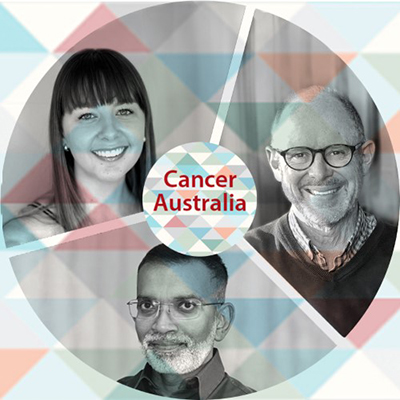 Dr Sarah Boyle, Prof Richard D’Andrea and Prof Michael Samuel.
Dr Sarah Boyle, Prof Richard D’Andrea and Prof Michael Samuel.Three Centre for Cancer Biology (CCB) researchers from UniSA and SA Pathology have collectively been awarded more than $1.3 million to further vital research into bowel cancer, acute myeloid leukaemia (AML) and breast cancer.
A team led by CCB scientist Professor Michael Samuel will investigate why people diagnosed with early-onset bowel cancer have a 50% chance of experiencing a relapse after surgery to remove the primary tumour. Compared to people diagnosed with late-onset bowel cancers, it is also more likely that the cancer will spread to other organs.
“At the moment we cannot predict whose tumours will return and whose won’t, resulting in some patients receiving unnecessary chemotherapy and others, who elect not to, relapsing,” Prof Samuel says.
“However, we have identified chemicals produced by tumours that affect the chances of cancer relapse. If we can block these from hijacking normal cells in their environment, this could be a new way of targeting bowel cancer.”
Prof Samuel’s team has been awarded $573,833 for this project, funded by Bowel Cancer Australia via Cancer Australia’s Priority-driven Collaborative Cancer Research Scheme.
CCB leukaemia researcher Professor Richard D’Andrea will use a $599,392 grant from Cancer Australia to analyse genetic changes and improve precision medicine for children with acute myeloid leukaemia (AML).
Although children diagnosed with AML undergo aggressive chemotherapy, approximately 30% do not survive.
“It is now widely understood that the genes we are born with can affect our risk of developing AML and influence the response to treatment,” Dr D’Andrea says.
“Despite this knowledge, guidelines for doctors on how to best treat childhood AML patients based on their individual genetic profile are lacking. This could be leading to suboptimal outcomes in some patients.
“We will address this gap by establishing national expert guidelines for inherited genetic changes that are identified in childhood AML patients, and by improving diagnosis and prognostication of familial predisposition, leading to better treatments.”
CCB Research Fellow Dr Sarah Boyle has been awarded $199,883 from Cancer Australia and the Can Too Foundation to investigate a new way of tackling the spread of breast cancer and improving outcomes for patients.
Metastatic breast cancer is the most common cause of cancer-related related death in women and is helped by changes in the immediate environment that surrounds the breast cancer. This is influenced by rogue chemicals released from cancers as they grow.
“Breast cancer cells release chemicals that act on normal cells in their environment, which aid the cancer to spread to other organs. This project will focus on finding a way to block these chemicals that alter the environment, to stop breast cancer metastasis,” Dr Boyle says.
Prostate cancer research will help slash Australia’s $1.3 billion health bill
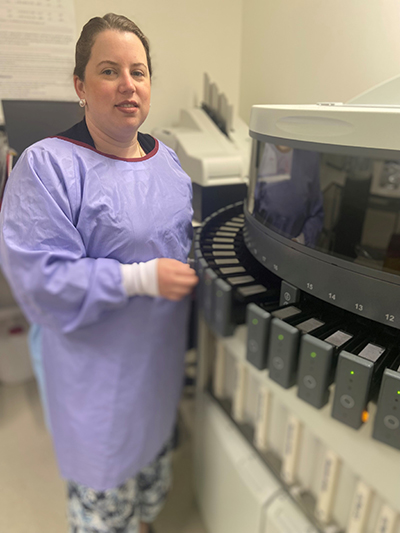
UniSA medical scientist Dr Jessica Logan has been awarded $300,000 from the Prostate Cancer Foundation of Australia (PCFA) to help improve appropriate treatment selection for men identified as low-risk patients.
The grant is one of five new, two-year projects selected by the PCFA to advance research into Australia’s most common and expensive cancer, which has killed more than 86,000 men since 1996.
This year, Australia is expected to set a record for the highest number of prostate cancer cases diagnosed in the nation’s history – an estimated 25,000 men.
Dr Logan’s research will focus on men currently identified as low-risk patients who qualify to be actively monitored by their clinical team, of which 35% will progress requiring treatment in the first two years and 59% within five years.
“Improved methods are needed to maximise early intervention and therapy selection while managing other medical conditions in low-risk patients to reduce the socioeconomic burden of prostate cancer in Australia,” Dr Logan says.
Prostate cancer is the nation’s single most expensive cancer to treat, accounting for 20% of cancer-related expenditure in Australia, costing taxpayers $1.3 billion annually.
Dr Logan is part of a UniSA team of scientists within the Mechanisms in Cell Biology and Disease research group (MICBAD) that made an international breakthrough in 2023, identifying three new biomarkers for prostate cancer.
The new biomarkers, when used together, will assist clinicians in determining which patients require immediate, radical treatment compared to those who need close monitoring.
This innovative technology is now in clinical practice in the United States and the aim is to further develop the technology and make it available in Australia.
Global honour for outstanding nurse researcher
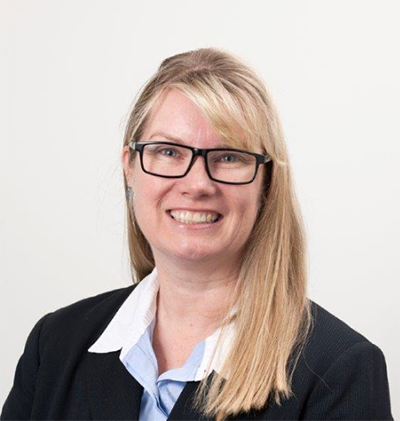
UniSA’s Professor Marion Eckert will become the University’s first inductee into the Sigma Theta Tau International Honor Society of Nursing (Sigma) International Nurse Researcher Hall of Fame.
The esteemed Hall of Fame honour recognises nursing researchers who have achieved significant recognition through outstanding research that has improved the nursing profession and community health outcomes. It is globally regarded as the highest accolade in nursing science.
Prof Eckert is UniSA’s Industry Professor of Health Innovation and Enterprise within UniSA Clinical and Health Sciences, and the inaugural director of the Rosemary Bryant AO Research Centre – a partnership between UniSA and the Rosemary Bryant Foundation. She is also South Australia’s inaugural Professor of Cancer Nursing in South Australia, located at UniSA.
UniSA Standing Acting Vice Chancellor, Distinguished Professor Marnie Hughes-Warrington AO, congratulated Prof Eckert on her latest honour.
“This prestigious new accolade for Marion acknowledges her contributions translating health research into community outcomes for more than three decades, improving healthcare delivery, policy and health services,” Prof Hughes-Warrington said.
“‘UniSA is proud to partner across Australia and New Zealand, and with the best nursing schools in the US, to seek outstanding outcomes for patients across health systems.”
As director of the Rosemary Bryant AO Research Centre, Prof Eckert leads a comprehensive, globally and locally targeted research program. Its current research activities focus on health workforce capacity, digital technology in healthcare, health service evaluations (Commonwealth and South Australia), evidence-based care including clinical practice improvement, and consumer centred care that supports society’s most vulnerable.
Prof Eckert will be inducted into the Hall of Fame at Sigma’s 35th International Nursing Research Congress in Singapore on 27 July 2024.
UniSA economist awarded ARC Fellowship to bolster public trust in water technology
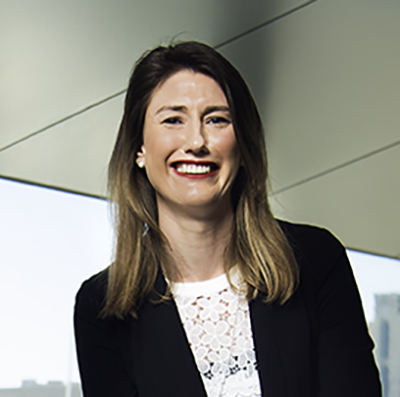
UniSA Business Senior Research Fellow and applied economist Dr Bethany Cooper has been awarded an Australian Research Council (ARC) Mid-Career Industry Fellowship.
She was awarded more than $827,000 for a project that seeks to build public trust in technology to secure Australia’s water future.
Dr Cooper is one of 25 fellowship recipients from universities across the country.
She says the project aims to identify the most workable solutions for explaining why new water related technologies are needed to guarantee the prosperity and health of the Australian community.
“Australia needs a range of solutions to its future water challenges, but some – such as the reuse of reclaimed water – are difficult to implement because of public reluctance around its use,” Dr Cooper says.
“The ongoing monitoring of wastewater for a range of risks, including infectious disease and illicit substances, is also threatened by rising public concerns about surveillance.
“This project provides the water sector with the essential knowledge it needs to overcome these hurdles and thereby build public trust that enables surety in the quality and quantity of water.”
Using leading-edge, economic techniques, she hopes to develop the first tool for measuring and predicting public trust in water-related technologies.
This will help the sector make choices that preserve trust while meeting often-competing health, environmental and economic demands.
ARC Acting Chief Executive Officer Dr Richard Johnson says the Mid-Career Industry Fellowships Program drives research collaboration, translation and commercialisation outcomes across a range of industry settings.
“In its second year, the Industry Fellowships Program has created pathways for academic researchers to establish careers in industry and industry-based researchers to work in university settings, with the aim of increasing two-way mobility and skill-building,” he says.
Liquid crystal nanoparticles supercharge antibiotics for cystic fibrosis
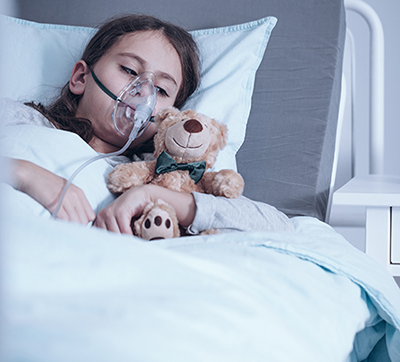
Cystic fibrosis is the most common, life-limiting genetic condition in Australia. It affects the lungs, digestive system and reproductive system, producing excess mucus, infections and blockages.
Now, following a $500,000 grant from Brandon BioCatalyst's CUREator incubator, through their CSIRO-funded Minimising Antimicrobial Resistance Stream, UniSA researchers are advancing the development of liquid crystal nanoparticle-formulated antibiotics to more accurately target and eliminate difficult-to-cure lung infections in people with cystic fibrosis.
Funded by the Medical Research Future Fund, CUREator provides grant funding to support the development of Australian biomedical research and innovations.
The study will use a patent-protected platform technology, invented by UniSA’s Centre for Pharmaceutical Innovation, to establish new therapies for cystic fibrosis sufferers. UniSA will also work with the Cystic Fibrosis Airways Research Group at the Women’s and Children’s Hospital to advance the platform.
In Australia more than 3600 people live with cystic fibrosis with one in every 2500 babies born with the disease.
Lead investigator UniSA’s Professor Clive Prestidge says that liquid crystal nanoparticles present a unique encapsulation and delivery system to improve the efficacy of antibiotics and overcome issues of antimicrobial resistance.
“When a person has cystic fibrosis, their body produces a sticky, thick mucus in the lungs which is prone to infection,” Prof Prestidge says.
“Bacterial lung infections often require antibiotics, but with frequent infections and regular ineffective antibiotic use, bacteria are becoming resistant to treatments; the looming antimicrobial resistance (AMR) pandemic is a major threat to human health.
“When there is infection and blockages in the lungs, it’s particularly hard for traditional antibiotics to reach their target. That’s where liquid crystal nanoparticles can help.
“By overcoming the processes that cause drug resistance and uncontrollable infection, this unique delivery approach can better target sites in the body where conventional antibiotic therapies cannot penetrate.”
Read more in the media release.
Business Intelligence Analyst Eric Ho honoured for promoting multiculturalism
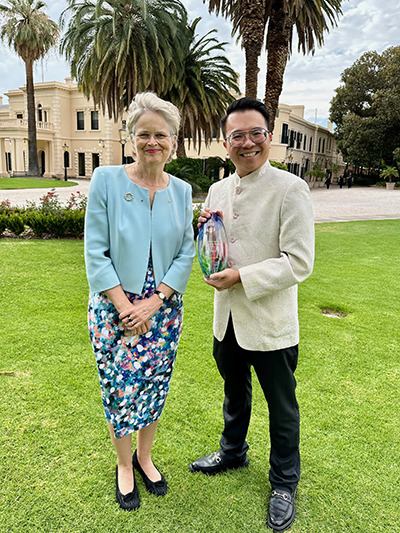 Governor of South Australia Frances Adamson AC with Eric Ho.
Governor of South Australia Frances Adamson AC with Eric Ho.Business Intelligence Analyst Eric Ho from UniSA’s Business Intelligence and Planning portfolio has been recognised for his positive contribution to multiculturalism in the community.
Ho was presented the Media Award at the 2023 Governor’s Multicultural Awards for advocating for intercultural understanding and helping to promote a culturally diverse state.
The award was presented by Governor of South Australia Frances Adamson AC at a ceremony at Government House.
Aside from his role at UniSA, Ho is also a media personality across a host of platforms including Facebook, WeChat, Little Red Book and TikTok. His content reaches more than 40,000 people around the world and promotes various cultural events.
Ho also runs a Chinese radio program that shares local news and information with the aim of making a positive difference to older people, in particular, who might be experiencing isolation and loneliness.
UniSA graduates dominate 2024 Helpmann Academy Awards
UniSA graduates took out 13 of the 17 prizes up for grabs as part of the recent Helpmann Academy annual Graduate Exhibition.
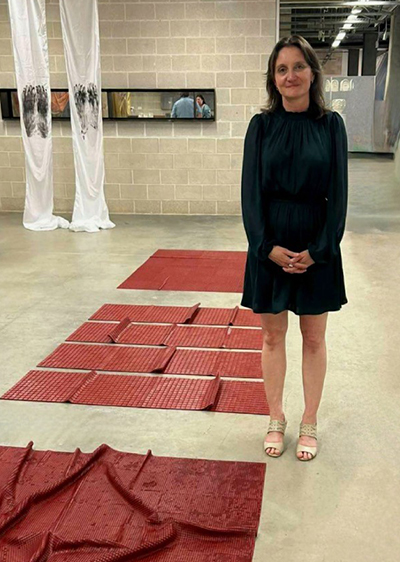 Contemporary Art graduate Katey Smoker took out top honours at the Helpmann Academy’s Graduate Exhibition.
Contemporary Art graduate Katey Smoker took out top honours at the Helpmann Academy’s Graduate Exhibition.The long-standing event acknowledges and celebrates emerging talent in South Australia's visual arts scene. UniSA hosted the exhibition at SASA Gallery on the City West Campus.
Among the winners was Katey Smoker, a Contemporary Art graduate, who scooped up top honours including The Helpmann Major Exhibition Award and the Helpmann Academy/ACE Studio Program Award.
Smoker will receive a 12-month studio residency at The Adelaide Contemporary Experimental and a solo exhibition at Linden New Art in Victoria.
"These awards offer me invaluable opportunities for recognition, exposure and professional development," she says. “They not only validate my artistic direction but also hold the potential to open doors to further opportunities to assist me with establishing my art practice.”
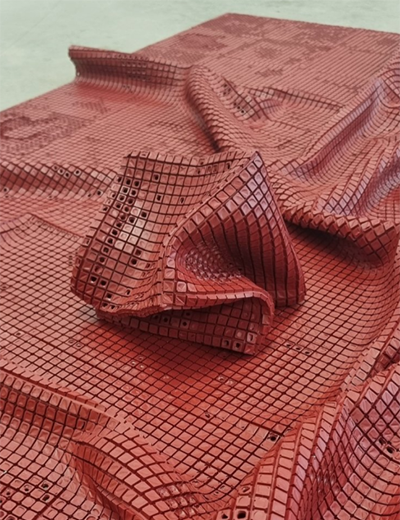 Katey Smoker’s installation, The Delicate Balance Between Intention and Intuition.
Katey Smoker’s installation, The Delicate Balance Between Intention and Intuition.Smoker’s artwork The Delicate Balance Between Intention and Intuition was created in 2023 as her final work for the Contemporary Art degree. It consists of three gridded sculptures crafted from house paint. Installed directly onto the floor, these pieces emphasise the accessibility of the grid while embodying a dynamic interplay between structure and freedom.
UniSA Creative Executive Dean Professor Craig Batty says the Helpmann Academy Graduate Exhibition is an important initiative acting as a launchpad to showcase the talents and achievements of recent graduates within the contemporary art community.
"Being selected for this exhibition not only validates students with a platform to publicly exhibit their work, but it also instils in them confidence to take the next steps towards establishing their art practice,” he says.
“The Helpmann Academy Awards are one of many opportunities UniSA Creative students have to engage with industry during their studies. Students have access to a number of fantastic development opportunities and industry connections across South Australia, including several in Adelaide's West End, such as the Samstag Museum of Art, ACE, JamFactory, Guildhouse, and the Mercury Cinema.”
UniSA winners:
- Max Callagahan – Helpmann Academy/UniSA Postgraduate Award
- Lauren Downton – Fetzer Award for Excellence and the City Rural Insurance Development Award
- Jess Harrison – Hill Smith Art Advisory Award
- Katherine Shierlaw – Lang Family Foundation/McKee Award
- Thao Le – City of Adelaide Award. Thao’s work will be acquired by the City of Adelaide’s for its art collection
- Bryan May – Square Holes Award
- Tiarnie Edwards – JamFactory Ceramics Award in collaboration with The Australian Ceramics Association
- Cameron Longshaw – Jaquillard Exhibition Award
- Tam Timko – SALA Award
- Eddie Normington – People's Choice Award.
Creative industries student shines with youth-centric TV show
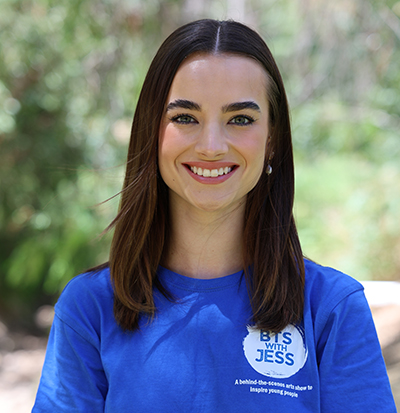 UniSA student Jessica McCall is the host of Channel 44 series BTS With Jess.
UniSA student Jessica McCall is the host of Channel 44 series BTS With Jess.UniSA creative industries student Jessica McCall might still be in her final year of her degree but is already making a name for herself on TV screens and at local community events.
McCall, who is studying a Bachelor of Creative Industries, majoring in journalism, film and TV, has launched her own show for community TV station Channel 44 in Adelaide.
She is the host, producer, director and editor of BTS With Jess, a youth-focused documentary, which includes interviews about and demonstrations of art creation with local arts groups for young people.
Season one launched on Channel 44, Channel 31 Melbourne and CTV+ on 8 April.
“As the presenter, I interview guests, visit arts groups for young people all around South Australia, and explore various creative activities including theatre, street art, dance and music – all of which I have enjoyed despite being a wide variety of arts topics,” she says.
“There are so many aspects of this project that I love – but as part of my journey towards being a TV presenter, appearing as the host of my own series is definitely the highlight. With this comes the opportunity to develop numerous networks and conduct a variety of interviews, where I am able to learn about the benefits of youth involvement with the arts.”
Her passion for the world of TV began in 2021 when she took on an MC role at the Gawler Show – the largest regional show in the state. Realising how much she enjoyed interviewing people, public speaking and hosting events, she decided to switch paths from studying secondary education to enrolling in the creative industries program.
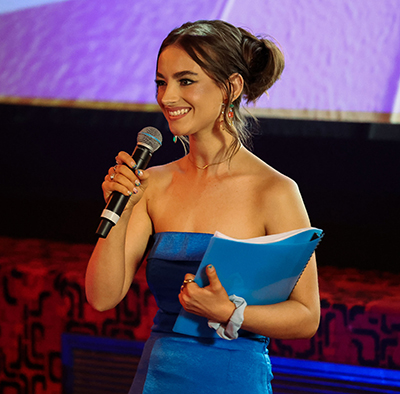 Jessica McCall at the BTS With Jess launch this month. Photo by Justine Vlachoulis.
Jessica McCall at the BTS With Jess launch this month. Photo by Justine Vlachoulis.Since hosting BTS With Jess, McCall has been asked to MC numerous events including expos and quiz nights, allowing her an opportunity to promote the show, expand her networks and “give back to the community”.
Last year, she began hosting art workshops in Gawler, where she helped young people create artworks using recycled materials.
“In these situations, I have witnessed how the arts brings young people out of their shells, builds relationships and adds value to the community,” she says.
“As an aspiring television presenter, my goal is to host educational and entertaining TV content including documentaries and programs that bring attention to meaningful stories and contribute to communities.
“When I graduate from UniSA, I will look for work in the media industry, which aligns with my goals. Until then, I am seeking opportunities to build my experience and develop skills to benefit my career as a presenter.”
Visit the BTS With Jess website or follow her on Facebook, Instagram or YouTube to find out more.
Other recent award winners
Other recent award recipients from UniSA include:
- Healthy Development Adelaide (HDA) and Channel 7 Children’s Research Foundation (CRF) PhD Excellence Award winner – UniSA PhD candidate Yohannes Efa. Read more
- HDA Women's Excellence in Research Award winner for 2024 – Senior Research Fellow in the Alliance for Research in Exercise, Nutrition and Activity (ARENA) at UniSA Dr Dot Dumuid. Read more
- Commendation for Inspiring South Australian Women’s Award – Deputy Vice Chancellor Distinguished Professor Marnie Hughes-Warrington AO. Read more
- Australian Awards for University Teaching (AAUT) Citation for Outstanding Contributions to Student Learning – Dr Min Pham. Read more (page 20)
ANNOUNCEMENTS
Meet UniSA’s 200,000th graduate
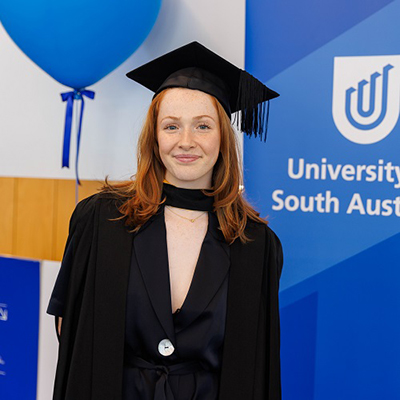 UniSA's 200,000th graduate, Emily Wilson.
UniSA's 200,000th graduate, Emily Wilson.Fantastic teachers have played a key role in the career direction of Emily Wilson, who graduated with a Bachelor of Psychology (Cognitive Neuroscience), at a ceremony this month at Pridham Hall.
Emily’s achievement has also marked a special milestone for the broader UniSA community, as the University’s 200,000th graduate.
Emily’s decision to study psychology was strongly influenced by her Year 12 psychology teacher, whose infectious passion for the subject resonated with their small, close-knit class.
“I was particularly interested in cognitive neuroscience, about brain function and cognition and how it has an effect on psychology,” Emily says.
Once at UniSA, Emily’s early experiences assured her it had been the right decision.
“The staff we had teaching us were amazing and really engaging,” she says.
“Dr Alex Chatburn taught the initial intro to neuroscience courses which were very interesting, he has obviously worked in the field for a long time and did a good job making very complex stuff understandable. It can be weird to dip your toe in this field as there are so many rabbit holes to go down, it could easily be overwhelming.
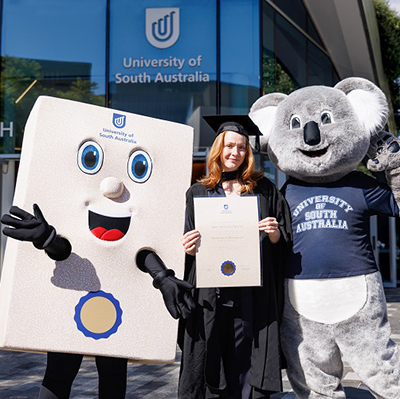 UniSA mascots Parchie and Koala joined the celebrations.
UniSA mascots Parchie and Koala joined the celebrations.“I loved all of the cognitive neuroscience subjects, they were cool to learn, and the anatomy subjects in the early years were great also”.
UniSA’s anatomy teaching team is renowned for its innovative and engaging approach, which saw them take out a national award recently.
With cognitive neuroscience and anatomy Emily’s favourite subjects, it’s not surprising that she’s keen to combine these in her future career, and is now studying a Master in Occupational Therapy at UniSA.
“I’d like to work in something related to neuroanatomy, such as helping people affected by strokes, or spinal injuries,” she says.
“Psychology and Occupational Therapy are both about working with clients all the time, which is really important to me.
“I’ve worked in hospitality throughout my tertiary studies and I have thoroughly enjoyed that, it fuels my love for interacting with people.”
Applications for UniSA’s Bachelor of Psychology (Cognitive Neuroscience), Bachelor of Psychology, Bachelor of Psychology (Honours) and Bachelor of Psychology (Counselling and Interpersonal Skills) are open now for mid-year entry.
UniSA outperforms SA universities for graduate employment
UniSA is celebrating strong graduate employment outcomes, solidifying its position as the number one university in South Australia for both undergraduate and postgraduate employment.
The achievement is based on the recently released 2023 Graduate Outcomes Survey – Longitudinal (GOS-L) national report.
UniSA Provost and Chief Academic Officer Professor Joanne Cys says UniSA graduates excel in key employment indicators.
“Notably, they hold the highest medium-term full-time employment rate (93%) among undergraduates in South Australia, ranking equal 12th nationally,” Prof Cys says. “This achievement marks the highest medium-term rate for UniSA graduates in the past five years.
“Additionally, UniSA leads the state in overall employment and labour force participation for both short-term (approximately four months post-graduation) and medium-term (three years post-graduation) periods, exceeding the national average and surpassing other South Australian public universities.”
At the postgraduate level, UniSA graduates have the highest medium-term overall employment rate (96.4%) in South Australia, even exceeding national benchmarks.
“These impressive results demonstrate the valuable skills and job-readiness cultivated within UniSA graduates,” Prof Cys says. “UniSA's graduates consistently outperform their peers in key areas compared to other South Australian universities and the national average.”
She says the latest findings demonstrate the real-world value of a UniSA degree in transitioning students into the workforce.
“We will continue developing career-ready students through work-integrated learning, networking events and self-development opportunities,” Prof Cys says.
Embodied carbon and overconsumption threatens SA’s green future: academic
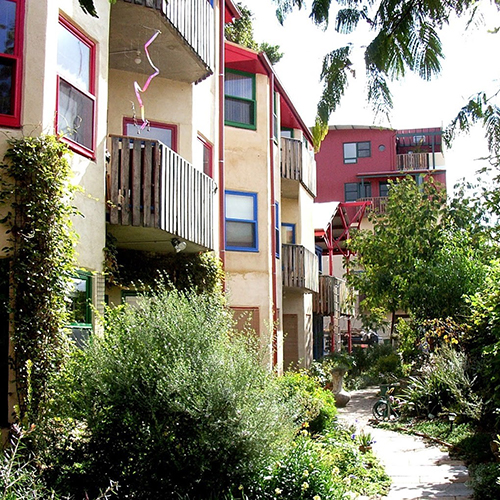 An example of low growth housing: Christie Walk Eco-City Adelaide. Credit: Dr Effie Best
An example of low growth housing: Christie Walk Eco-City Adelaide. Credit: Dr Effie BestA UniSA academic has criticised a South Australian campaign to “Build a Bigger, Better SA” for being detrimental to the planet and damaging to the state’s future.
UniSA architect and infrastructure expert Dr David Ness says South Australia’s leadership in renewable and clean energy is being undermined by overconsumption and an obsession with growth.
“Whenever we consume excessive materials and natural resources for clothing, food, cars and especially buildings, their production generates ‘embodied or consumption carbon’,” Dr Ness says. “This is completely overlooked in most climate policies, which focus on direct energy use.
“The campaign to ‘Build a Bigger and Better SA’ is misguided, when it promotes more huge commercial towers. We can be a better SA, without the need to build bigger.
“In wealthier societies such as ours, we should repurpose and make better use of what we have. Do we really need another Festival Tower of 40,000 sq m, when over 20% of existing office space is vacant?”
Dr Ness made the comments as part of the opening of the Royal South Australian Society of the Arts gallery’s 15th Solar Art Prize.
Dr Ness has previously said Adelaide is at risk of failing to meet the net zero 2050 target for building emissions unless it adopts a more modest and sustainable approach in its next city plan due in 2024.
Read more in the media release.
Other Stories
- Young African students call out racial stereotypes in TikTok first
- Beloved but broken items given new life in unique arts project
- Targeted liver cancer treatment kills cancer cells and cuts chemo side effects
- Think $5.50 is too much for a flat white? Actually it’s too cheap, and our world-famous cafes are paying the price
- From the Vice Chancellor: In motion
- Achievements and Announcements
- ‘Mud wizard’ shares their Aboriginal Pathway Program success story
- Who knew that eating poo was so vital for birds’ survival?
- In Pictures: April graduation ceremonies
- The latest books from UniSA researchers



